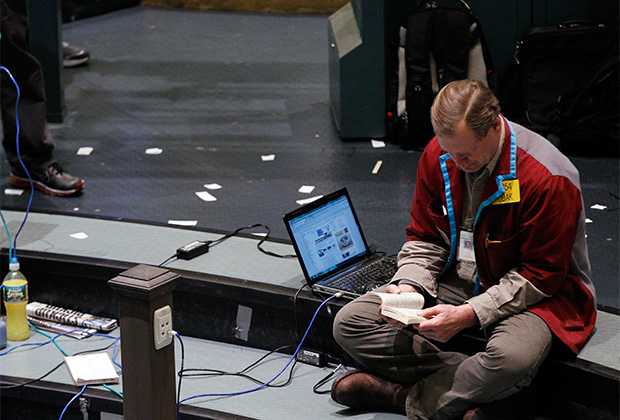Sir Tim Berners-Lee, who modestly proposed the creation of the Internet 28 years ago, published an open letter in which he identified the three main problems of modern users. He believes that it is necessary to solve several global issues at once, otherwise humanity will face serious consequences. figured out what threatens network users and how to prevent the Internet from turning into a global trap.
Access to nowhere
In March 1989, the British programmer Tim Berners-Lee proposed to his colleagues at CERN (European Laboratory for Nuclear Research) a World Wide Web project that would allow all information to be collected in one place and accessible from any computer. The project was approved and implemented.
Berners-Lee himself claims that he dreamed of a completely open platform and was always ready to defend its freedom, but the events of the past year made him strongly doubt the bright future of the network.
He identified three trends that are booming on the internet and could destroy it.
We no longer control our personal data
Now most sites willingly share free content in exchange for users' personal data. People are accustomed to putting up with this tacit barter and often ticking the boxes next to confidentiality agreements without question.
In fact, everyone who transfers confidential information to the administration of sites forever misses the opportunity to control it. Portals collect data and use it for their own purposes. Moreover, people often cannot decide how much information and in what form to give in exchange for content. Companies ask for what they need, and users are not allowed to discuss it.
But personal information on the Internet is needed not only for profit. Much more worrisome, Berners-Lee says, is that data can be collected by governments and intelligence agencies. The scientist is extremely concerned that laws are passed in unfree states that allow intrusion into private life. In countries with strict laws, bloggers can be imprisoned or killed, and political opponents can be monitored online.
He recalls the case of the arrest of a group of bloggers in Ethiopia. Six members of the Zone9 group and three associated journalists covering political and social issues in the country were arrested in 2014 on suspicion of terrorism.
They were caught using anonymous messaging tools. This, according to the authorities, is a good reason to accuse the opposition of treason. True, all were acquitted, but some had to spend 18 months in prison. The public actively supported the activists while they were tried to intimidate them with a prison term.
The scientist warns: even in countries where citizens' data is collected in their own interests, things can go too far. In addition, the feeling that you do not belong to yourself gives rise to a banal fear of discussing important issues.
Lies are spreading too fast
Although the Internet is truly limitless, a person constantly visits only a few sites and most often uses the same search engine. All these resources earn on clicks, which means that they are interested in seeing as much provocative and shocking materials as possible.
Social networks and search engines are constantly collecting data about users' movements through pages, about their gender, age, social status - about everything that could be useful for improving algorithms. In the end, we see in advertising, on websites or in search exactly what we are most likely to click on.
This is what allows fake material to spread across the network like wildfire. False news shocks, surprises, affects the taboo aspects of life, in a word, they do everything so that the user clicks on the link.
But Berners-Lee is not so much afraid of the boom of fakes as the potential harm from their use for profit or political manipulation.
Political campaigning on the Internet should be transparent
Advertising of political views, parties and leaders in recent years no longer differs from ordinary marketing. Algorithms that measure user preferences can reveal their desires and concerns, targeting propaganda to the “right” audience. Moreover, announcements with political overtones can be made individually for each voter.
According to some reports, during the 2016 presidential race in the United States, about 50,000 completely different ads were published on Facebook alone during the day. This amount of information is impossible to contain or verify.
Berners-Lee expressed suspicions that politicians are intentionally supplying their slogans with links to fake sites. These portals contained only the information that is beneficial to the candidate, seasoned with various incriminating news about the opponent.
The scientist believes that in such conditions, democracy, a favorite topic of politicians, is out of the question. Managers and curators of the election campaign tell one group of voters one thing, another - quite the opposite. The content that the user sees depends only on his personal preferences. Conservationists will be happy to click on an article about how a politician actively greens, but for other, more conservative voters, the same candidate may appear as a fighter against the dominance of minorities.
Many questions, few answers
These problems, as simple as they may seem, have the potential to change the global web and erase any notion of privacy and anonymity. While people are increasingly mastering the Internet and are beginning to realize that they have their own rights in this space, states are considering options for universal control.
The creator of the World Wide Web is sure that giants like Facebook should be encouraged for their desire to develop technologies that do not allow confidential information to scatter throughout the network and fall into the hands of intruders. Berners-Lee advocates that large companies fight as actively as possible for the right to destroy fakes and in no case entrust these functions to the state.

Remembering the years of the origin, formation and development of the network, the programmer insists that users must fight for their rights on the Internet and finally realize that even in the digital world there are rules of conduct. As in real life, scammers operate in a virtual environment, steal savings, insult and humiliate - all this makes the Internet not an addition to the existing world, but its full-fledged continuation.
The creators of algorithms that adapt to user preferences usually keep their developments secret, citing their uniqueness and complexity. But Berners-Lee insists that these very algorithms affect the life of mankind, which means that they must be extremely transparent. For example, not only developers, but also ordinary people should know about the principle of the Facebook feed.
Political games are the blind spot of the Internet, the scientist is sure. No one regulates them, and the politicians themselves are not yet fully aware of what power they have and how to manage it. Campaigning on the Internet, especially on the political agenda, should be manageable and not turn users into obedient puppets.
Five years of the Internet
In 2009, Berners-Lee established the World Wide Web Foundation to provide access to the Internet to every earthling and protect their rights. In February, the organization presented a five-year strategy for the development of the Internet for 2017-2022. What specialists are trying to convey to the public is extremely simple: the Internet is created for everyone.
The members of the Foundation boldly declare that they are ready to fight for digital equality and a just world. The Internet was created so that everyone equally had access to all the knowledge of mankind, but it turned out that here, too, some groups of people are more powerful than others.
Berners-Lee hoped that with the help of his invention, people would be able to communicate with each other from anywhere in the world, and everyone would have the opportunity to express their point of view, participate in discussions and search for truth. But it turned out that online information isolates people, fills them with hatred, intolerance and destroys the right to privacy.

Over the next five years, the organization intends to focus on three points. The first is the right of people to be heard, and experts are ready to push for the adoption of protective laws in order to eradicate among users the fear of punishment for what is said or written on the network.
The Fund wants to hold Internet giants accountable: to force them to reveal the schemes of the algorithms that form the Internet, to stop secretly collecting information about people and transferring it to government agencies.
The third point of the program is devoted to the female half of humanity: according to the members of the World Wide Web Foundation, it is they, as well as representatives of minorities, who can get the opportunity to fully participate in economic life, create companies and improve their financial literacy using the Internet.



